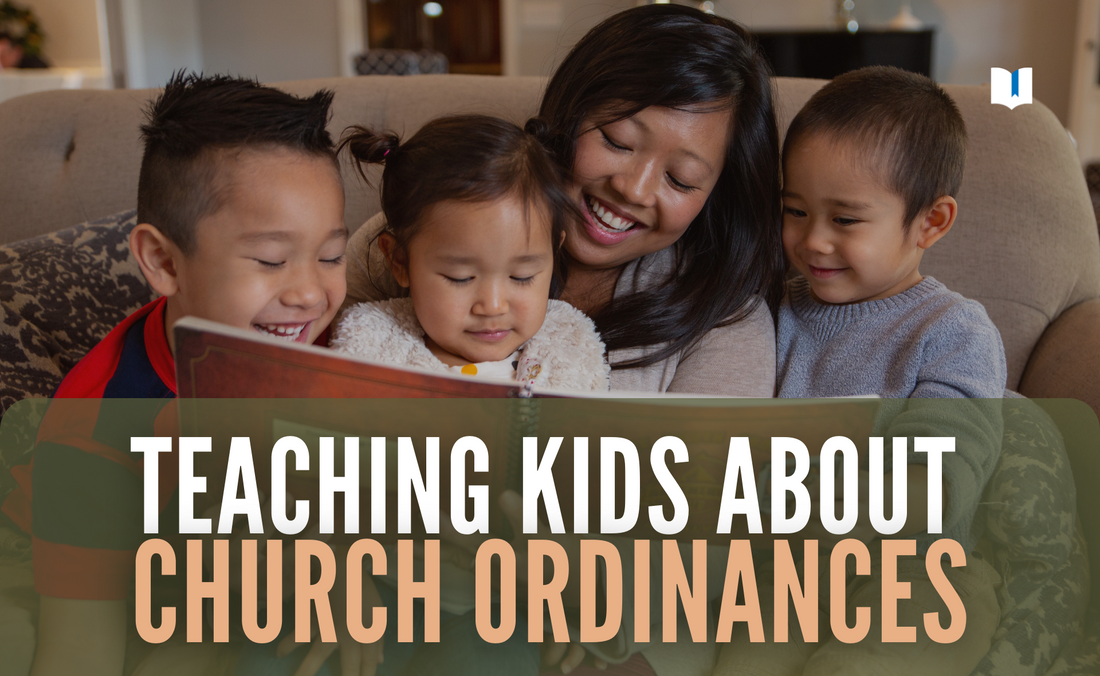
Teaching Kids about Church Ordinances
Share
When the church practices baptism and the Lord’s Supper, parents have a prime opportunity to teach their children about the gospel. Jesus commanded the apostles to practice these two ordinances regularly in the church, and each one consistently provides focused pictures to the saints of the power and love of God in salvation. So what principles should parents instill in their children as they observe the ordinances of the church? Consider the following four guidelines.
Define the word ordinance for your children.
Defining a word removes confusion surrounding it. “An ordinance is an outward and visible sign which was ordained by Christ as a symbol of a deeper spiritual reality” (Adventure Club: The Truth About The Bible, The Church & The End Times Teacher Book p.92) In other words, an ordinance is simply “something that has been ordered for regular practice.” It is a regulated custom. Explain to your children that the ordinances of the church—baptism and the Lord’s Supper—were commanded by Jesus Himself. Jesus commanded His disciples to make disciples, “baptizing them in the name of the Father, the Son, and the Holy Spirit” (Matt 28:19). And Jesus commanded the Church to eat the bread of His body and drink the cup of the new covenant in His blood regularly in remembrance of Him (1 Cor 11:23–26). Therefore, the church practices baptism and the Lord’s Supper first and foremost as expressions of obedience to Jesus Christ.
For as often as you eat this bread and drink the cup, you proclaim the death of the Lord until He comes. (1 Cor. 11:26 LSB)
Teach your children that church ordinances are exclusively for believers.
When a person is saved and then baptized, they are called by Scripture to identify themselves with the church publicly. They are to proclaim their faith in Jesus Christ as Savior and Lord, along with their desire to be counted among the members of the church (Acts 2:37–42). And when someone eats the Lord’s Supper, they proclaim the Lord’s death until He returns (1 Cor 11:26). Therefore, church ordinances are only for believers to practice together. As children observe baptism and the Lord’s Supper, it can be an excellent opportunity to talk to them about the importance of the fellowship with the saints, their relationship with God, and their trust in Jesus Christ.
Teach your children that church ordinances are not magical or mystical, but rather are set apart for God.
Children can easily see the special ceremonies of the church and erroneously believe that there is something magical in the waters of baptism or the bread and cup of the Lord’s Supper. However, the Bible teaches that there is nothing inherently special in the water, the bread, or the cup—they are simply ordinary elements that share a symbolic significance in relations to a believer’s life in Christ. At the same time, these practices are not ordinary because they have been commanded by God to put His work of salvation on display. Because they are set apart to God, they are holy, and believers must not practice them lightly. Paul warned the Corinthian church about God’s severe discipline when some of their members were eating the Lord’s Supper in an unworthy manner. Therefore, church ordinances can be an opportunity to talk to your children about God’s holiness and the matters of the highest importance in life—the eternal salvation of our souls.
Finally, use the ordinances to teach your children the gospel.
Both baptism and the Lord’s Supper are pictures of the good news. Baptism proclaims the transforming power of the gospel when a believer is brought from death to new life through union with Jesus Christ. The Lord’s Supper symbolizes the broken body and shed blood of Jesus, pointing to His sacrificial death on the cross. When your children see the church practicing these biblical ordinances, make the most of the opportunity to teach them about new life in Christ and His sacrifice of love for sinners.
Indeed, parents have a unique opportunity to proclaim Christ to their children when a new believer is baptized, or when the church gathers for the body and blood of Jesus. They must be diligent to guard their children against partaking sinfully in these practices when they are not yet believers. Additionally, in baptism and the Lord’s Supper, the Lord graciously gives parents the special and unique opportunity to communicate to their children their hope, desire, and prayer that God will one day save them so that they too will love and obey Christ.

1 comment
Do you have the children’s materials bilingual? And up to what age do yo ha materials for children?